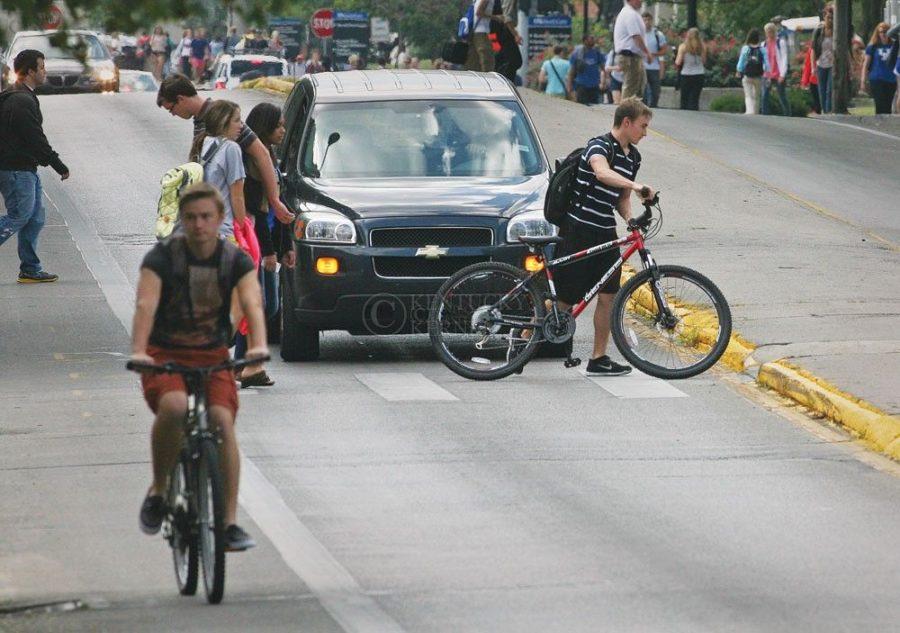Bikes on campus cause safety concerns
September 26, 2013
By Laura Shrake | Assistant News Editor
In two and a half years on his bicycle, Rick Freeman never had any problems.
He started off with leisurely rides to the book store, then started using his bike as a mode of transportation to class.
But a figurative bump in the road on his commute home from class kept him off his bike for a few weeks.
Freeman was hit by a car while riding his bike down Columbia Avenue when a driver making a right turn collided with him, he said.
As the cars in front of him began to stop for traffic, Freeman went around the car on the right and into where the bike lane would have been on the right side of the road, if there was one.
Freeman said it is unclear whether or not the driver used a turn signal, but the car turned into Freeman on his bike.
After “busting” his lip and scraping his forehead and knee, Freeman said he’ll now be more proactive and defensive when biking.
“I just assumed that cars looked out for bikers,” said Freeman, a secondary English education senior. “But now I’ll have to be … a little more aware of what’s going on.”
As a biker on campus, Freeman said he sees a misunderstanding between drivers and bikers.
“A lot of bikes ride on the sidewalks, which sends a mixed message to drivers,” he said. “They think the sidewalk is where (bikers) are supposed to be.”
In addition to shared roads, UK also has shared sidewalks, largely located by W.T. Young Library and White Hall Classroom Building, according to a UK Bicycling Basics handout.
Those who choose to utilize such sidewalks are encouraged to go slow, always yield to pedestrians and only cross the street at sidewalks, the handout said.
Freeman thinks learning how to interact with bikes on the road should be part of learning how to drive. He sees a large range in the experience bikers have.
“Some are serious commuters who know what they’re doing,” Freeman said. “Others hop on a bike because they want to wake up later and wing it.”
Officer Howard Florence of the Lexington Police Department said the interaction of bikes, cars and students on campus is “chaotic,” with “bikes everywhere, mixing with a few thousand students.”
“I see a lot of bikes that run red lights, don’t signal (their turns), or are not paying attention,” Florence said. “I see cars that don’t check their right side to see if there’s a bike there and that pass too close to a bike.”
Florence said the disconnect between motorists and cyclists exists because one or both parties is either uneducated or not paying attention to their surroundings.
“We need to educate the public,” he said. “Educating is the way to fix (the problem).”
One main point that was emphasized at the event “Improving Bike Safety: A Conversation,” was the fact that bikes are considered vehicles and thus have the right to ride in the street, but that they have the responsibility of following traffic laws.
“If you’re a bike in the street, you have the same rights and responsibilities a car has,” Florence said. “You can be pulled over for anything a car can.”
Kentucky Revised Statute 189.231 states that all bicycles “shall obey traffic controls … meaning stop lights and stop signs for example.”
However, Florence said there is no law that bans bikes on sidewalks, but in certain places it is technically prohibited.
Florence said that because traffic laws apply to cyclists, they can have points deducted from their licenses because of a violation.
Many questions have been raised with regards to this issue because of several bike accidents in the area, one of which involved 26-year WKYT anchor and “avid cyclist” Sam Dick.
Dick, who served as the moderator for the bike safety conversation, said he was going “way too fast” when a car pulled out in front of him.
He received stitches for a gash on his eyebrow, separated his shoulder and had a mild concussion as a result of the accident.
“I knew I was hurt pretty bad because I could feel it,” Dick said. “…but the bike helmet saved me from really having really bad injuries. I could’ve fractured my skull.”
Carol Wright of the UK Healthcare Level I Trauma Center is a partner in the collaboration for recent bike safety events. She said the biggest problems with bikes in Lexington are cyclists not wearing helmets and a disregard of traffic laws as they pertain to bikes.
“Cars will always win,” Wright said. “Cyclists need to be aware of what our law says about those who use cycling as their primary transportation or even just for recreation. It’s really (about) protecting themselves.”
For more information regarding bike safety and rules of the road, visit www.bikeleague.org, or read UK Bicycling Basics, available online at www.uky.edu/pts/BAC.
































































































































































